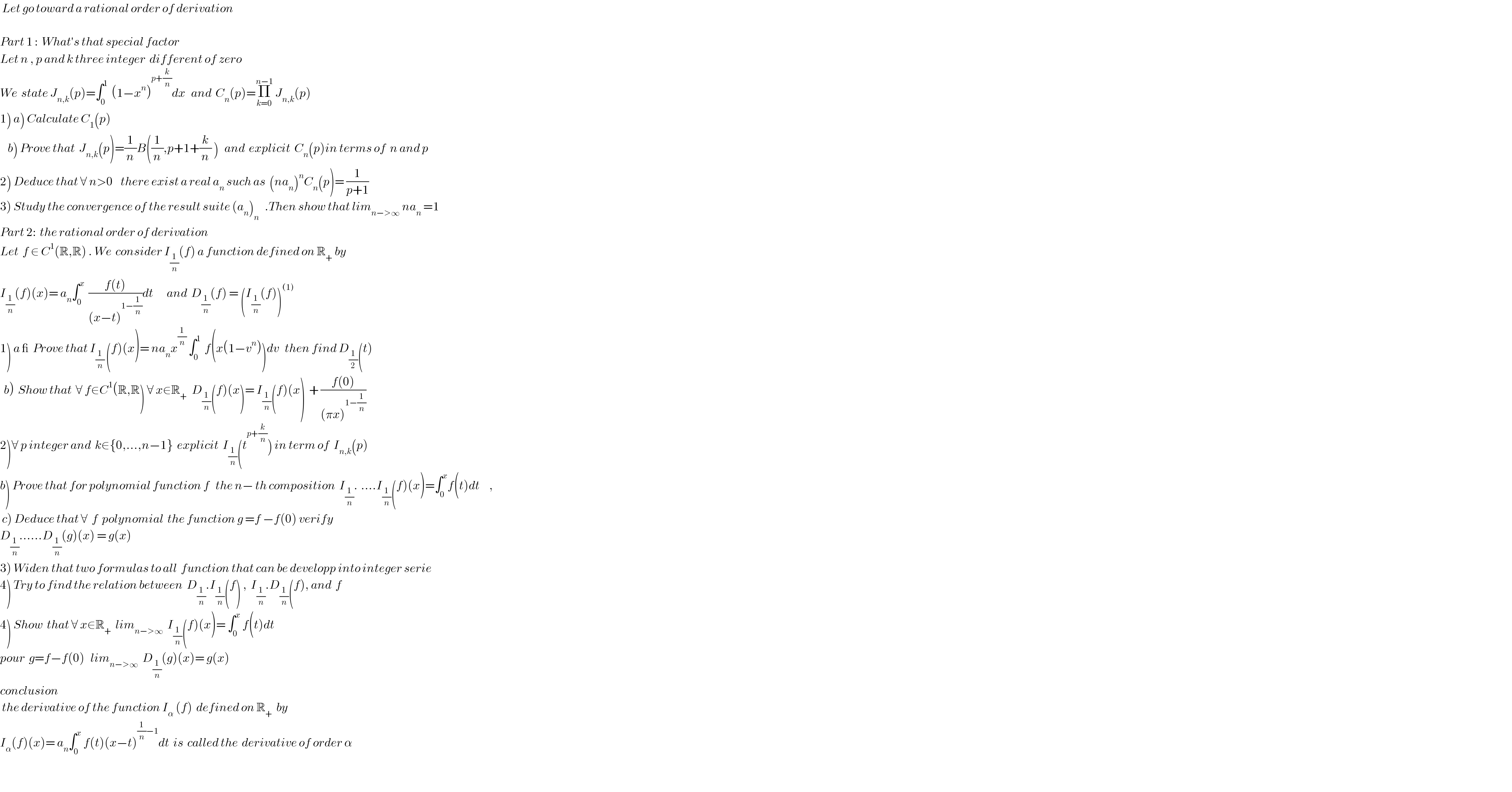
Question Number 65828 by ~ À ® @ 237 ~ last updated on 04/Aug/19

$$\:{Let}\:{go}\:{toward}\:{a}\:{rational}\:{order}\:{of}\:{derivation} \\ $$$$ \\ $$$${Part}\:\mathrm{1}\::\:\:{What}'{s}\:{that}\:{special}\:{factor}\:\: \\ $$$${Let}\:{n}\:,\:{p}\:{and}\:{k}\:{three}\:{integer}\:\:{different}\:{of}\:{zero} \\ $$$${We}\:\:{state}\:{J}_{{n},{k}} \left({p}\right)=\int_{\mathrm{0}} ^{\mathrm{1}} \:\:\left(\mathrm{1}−{x}^{{n}} \right)^{{p}+\frac{{k}}{{n}}} {dx}\:\:\:{and}\:\:{C}_{{n}} \left({p}\right)=\underset{{k}=\mathrm{0}} {\overset{{n}−\mathrm{1}} {\prod}}\:{J}_{{n},{k}} \left({p}\right) \\ $$$$\left.\mathrm{1}\left.\right)\:{a}\right)\:{Calculate}\:{C}_{\mathrm{1}} \left({p}\right)\:\: \\ $$$$\left.\:\:\:\:{b}\right)\:{Prove}\:{that}\:\:{J}_{{n},{k}} \left({p}\right)=\frac{\mathrm{1}}{{n}}{B}\left(\frac{\mathrm{1}}{{n}},{p}+\mathrm{1}+\frac{{k}}{{n}}\:\right)\:\:\:{and}\:\:{explicit}\:\:{C}_{{n}} \left({p}\right){in}\:{terms}\:{of}\:\:{n}\:{and}\:{p}\: \\ $$$$\left.\mathrm{2}\right)\:{Deduce}\:{that}\:\forall\:{n}>\mathrm{0}\:\:\:\:{there}\:{exist}\:{a}\:{real}\:{a}_{{n}} \:{such}\:{as}\:\:\left({na}_{{n}} \right)^{{n}} {C}_{{n}} \left({p}\right)=\:\frac{\mathrm{1}}{{p}+\mathrm{1}}\: \\ $$$$\left.\mathrm{3}\right)\:{Study}\:{the}\:{convergence}\:{of}\:{the}\:{result}\:{suite}\:\left({a}_{{n}} \right)_{{n}} \:\:\:.{Then}\:{show}\:{that}\:{lim}_{{n}−>\infty} \:{na}_{{n}} \:=\mathrm{1} \\ $$$${Part}\:\mathrm{2}:\:\:{the}\:{rational}\:{order}\:{of}\:{derivation} \\ $$$${Let}\:\:{f}\:\in\:{C}^{\mathrm{1}} \left(\mathbb{R},\mathbb{R}\right)\:.\:{We}\:\:{consider}\:{I}_{\frac{\mathrm{1}}{{n}}} \left({f}\right)\:{a}\:{function}\:{defined}\:{on}\:\mathbb{R}_{+} \:{by}\:\:\: \\ $$$${I}_{\frac{\mathrm{1}}{{n}}} \left({f}\right)\left({x}\right)=\:{a}_{{n}} \int_{\mathrm{0}} ^{{x}} \:\:\frac{{f}\left({t}\right)}{\left({x}−{t}\right)^{\mathrm{1}−\frac{\mathrm{1}}{{n}}} }{dt}\:\:\:\:\:\:\:{and}\:\:{D}_{\frac{\mathrm{1}}{{n}}} \left({f}\right)\:=\:\left({I}_{\frac{\mathrm{1}}{{n}}} \left({f}\right)\right)^{\left(\mathrm{1}\right)} \:\: \\ $$$$\left.\mathrm{1}\right)\:{a}\:\_\:\:{Prove}\:{that}\:{I}_{\frac{\mathrm{1}}{{n}}\:} \left({f}\right)\left({x}\right)=\:{na}_{{n}} {x}^{\frac{\mathrm{1}}{{n}}} \:\int_{\mathrm{0}} ^{\mathrm{1}} \:\:{f}\left({x}\left(\mathrm{1}−{v}^{{n}} \right)\right){dv}\:\:\:{then}\:{find}\:{D}_{\frac{\mathrm{1}}{\mathrm{2}}} \left({t}\right) \\ $$$$\left.\:\:{b}\right)\:\:{Show}\:{that}\:\:\forall\:{f}\in{C}^{\mathrm{1}} \left(\mathbb{R},\mathbb{R}\right)\:\forall\:{x}\in\mathbb{R}_{+\:\:} \:{D}_{\frac{\mathrm{1}}{{n}}} \left({f}\right)\left({x}\right)=\:{I}_{\frac{\mathrm{1}}{{n}}} \left({f}\right)\left({x}\right)\:\:+\:\frac{{f}\left(\mathrm{0}\right)}{\left(\pi{x}\right)^{\mathrm{1}−\frac{\mathrm{1}}{{n}}} } \\ $$$$\left.\mathrm{2}\right)\forall\:{p}\:{integer}\:{and}\:\:{k}\in\left\{\mathrm{0},...,{n}−\mathrm{1}\right\}\:\:{explicit}\:\:{I}_{\frac{\mathrm{1}}{{n}}} \left({t}^{{p}+\frac{{k}}{{n}}} \right)\:{in}\:{term}\:{of}\:\:{I}_{{n},{k}} \left({p}\right) \\ $$$$\left.{b}\right)\:{Prove}\:{that}\:{for}\:{polynomial}\:{function}\:{f}\:\:\:{the}\:{n}−\:{th}\:{composition}\:\:{I}_{\frac{\mathrm{1}}{{n}}} ._{} ....{I}_{\frac{\mathrm{1}}{{n}}} \left({f}\right)\left({x}\right)=\int_{\mathrm{0}} ^{{x}} {f}\left({t}\right){dt}\:\:\:\:\:,\:\: \\ $$$$\left.\:{c}\right)\:{Deduce}\:{that}\:\forall\:\:{f}\:\:{polynomial}\:\:{the}\:{function}\:{g}\:={f}\:−{f}\left(\mathrm{0}\right)\:{verify} \\ $$$${D}_{\frac{\mathrm{1}}{{n}}} ......{D}_{\frac{\mathrm{1}}{{n}}} \left({g}\right)\left({x}\right)\:=\:{g}\left({x}\right) \\ $$$$\left.\mathrm{3}\right)\:{Widen}\:{that}\:{two}\:{formulas}\:{to}\:{all}\:\:{function}\:{that}\:{can}\:{be}\:{developp}\:{into}\:{integer}\:{serie} \\ $$$$\left.\mathrm{4}\right)\:{Try}\:{to}\:{find}\:{the}\:{relation}\:{between}\:\:{D}_{\frac{\mathrm{1}}{{n}}} .{I}_{\frac{\mathrm{1}}{{n}}} \left({f}\right)\:,\:\:{I}_{\frac{\mathrm{1}}{{n}}} .{D}_{\frac{\mathrm{1}}{{n}}} \left({f}\right),\:{and}\:\:{f}\:\: \\ $$$$\left.\mathrm{4}\right)\:{Show}\:\:{that}\:\forall\:{x}\in\mathbb{R}_{+} \:\:{lim}_{{n}−>\infty} \:\:{I}_{\frac{\mathrm{1}}{{n}}} \left({f}\right)\left({x}\right)=\:\int_{\mathrm{0}} ^{{x}} \:{f}\left({t}\right){dt}\:\:\:\:\:\:\: \\ $$$${pour}\:\:{g}={f}−{f}\left(\mathrm{0}\right)\:\:\:{lim}_{{n}−>\infty} \:\:{D}_{\frac{\mathrm{1}}{{n}}} \left({g}\right)\left({x}\right)=\:{g}\left({x}\right) \\ $$$${conclusion} \\ $$$$\:{the}\:{derivative}\:{of}\:{the}\:{function}\:{I}_{\alpha} \:\left({f}\right)\:\:{defined}\:{on}\:\mathbb{R}_{+} \:\:{by}\: \\ $$$${I}_{\alpha} \left({f}\right)\left({x}\right)=\:{a}_{{n}} \int_{\mathrm{0}} ^{{x}} \:{f}\left({t}\right)\left({x}−{t}\right)^{\frac{\mathrm{1}}{{n}}−\mathrm{1}} {dt}\:\:{is}\:\:{called}\:{the}\:\:{derivative}\:{of}\:{order}\:\alpha \\ $$$$ \\ $$
Commented by ~ À ® @ 237 ~ last updated on 04/Aug/19

$$\:\:\:{I}_{\alpha} \left({f}\right)\left({x}\right)={a}_{{n}} \int_{\mathrm{0}} ^{{x}} \:\:{f}\left({t}\right)\left({x}−{t}\right)^{\alpha−\mathrm{1}} {dt} \\ $$
